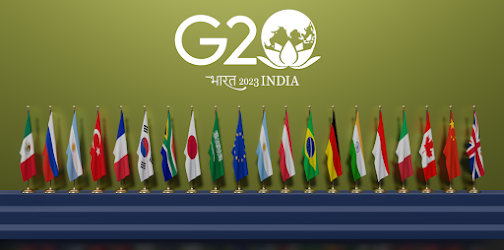Rising Power and Evolving Priorities: Changes expected in the G20.
After 24 years of foundation, finally India
has the privilege to host the G20 summit. The spirit of India’s G20
chairmanship is manifested in the theme of ‘One Earth, One Family, One Future’
enshrined in the ancient Sanskrit ethos as ‘Vasudahaiva Kutumbakam.’ The
lotus emblem in the G20 logo illustrates hope in these troubling times. It is
said that India will harness its G20 presidency to reach constructive solutions
to various challenges, like reviving global growth, more decisive climate
actions and robust global health architecture. It all sounds virtuous, but is
the common man really compassionate about climate change? Does an average
Indian student, who is deprived of basic public transport, care about global
growth?
Yes, the G20 is a great opportunity for India
to manifest itself as a global leader and showcase its problem-solving skills
to the world economy, but more importance should be given to resolving our own
problems. Here are some of the problems which should be addressed by the
government:
- Mental
health and physical health: On the economic front, India is climbing some
remarkable ladders. On the contrary, the counter-effects of economic
development or the activities that are contributing to economic
development, like long working hours and work-life dissonance, are causing
severe health issues among Indians. Today, India is known as the world
capital for diabetics. According to a survey by economic times, 38% of
working professionals in India spend time sitting, citing long working
hours.
Child obesity has also emerged as an alarming problem. One in every 10 children in India is obese. Extended working hours, no physical movement, and binge eating are causing heart attack problems among millennials. The average heart attack age has slid down to 40. Mental health issues are also on the rise. For long, mental health had been looked down upon, at least in India. Somehow, after the pandemic, mental health has gained the importance that it should have had long ago.
Young shoulders have been burdened with responsibilities, which they are not immune to dealing with. These problems should be addressed as and when they arise. Postponing or neglecting them can increase the severity. A favourable environment for dealing with mental health problems should be created. What good would it do when India becomes the world's largest economy and the unhealthiest country at the same time? Economic growth on the verge of deteriorating health is not favourable. Compromising one for the other would lead to disastrous results.
- Indian education system: The Indian
education system hasn’t been as favourable as it should have been for a
student. It is a monotonous system that focuses on traditional knowledge.
Albert Einstein once said that if you judge a fish by its ability to
climb, it will live its whole life believing that it is stupid. Our
education system burdens us with making ourselves familiar with a set of
subjects, irrespective of our likings and grasping powers. More importance
is given to improving our weaknesses than working on our strengths. India is
a country rich in talents, but these talents have not been given the
required opportunity to showcase their skills. Take the NEET exam for that
matter. Every year, around 10 lakh students appear for this competitive
medical exam and only 8% get selected. What happens to those 92% who
weren’t given the opportunity to show their talents? They go unheard.
Similar things happen with the IITs and IIMs. I agree that having such low acceptance rates can fetch high quality gems, but there should be an alternative for those 92% to fall forward upon. Reservations are a big, yet delicate issue that should be handled with the utmost care. Corporates need skilled craftsmen, but our system lacks the required environment for these craftsmen to practise their art. There are a few courses that need an immediate turnaround. Infusion of high-quality professors, adoption of personalised teaching solutions, inculcating technology, and introduction to real-world working models are some possible solutions that might help improve the Indian education system. - Public Transport: As of 2021, 57% of boys and 62% of girls residing in urban areas walk to their schools. According to a survey conducted by The Times of India, bus and train are the most preferred means of transport chosen by Indian students. 16% of Indian students travel using public transport on a daily basis. 58% of our population falls below the age of 29. That means a big chunk of our population benefits from this service, day in and day out. Indian public transport craves policy-level reforms. Migration to urban areas is increasing rapidly. Integrating different means of transport and creating a favourable infrastructure are some of the possible solutions that could be considered.
Retrospectively
speaking, changes haven’t been easy to digest, but they sure have the power to
enrich our lives. Highlighting problems is a cinch, but implementing solutions
isn't a piece of cake, considering the size of this country. The G20 forum
should be used constructively for the betterment of the average Indian. In the
end, I would like to say that completely depending upon the government sounds
insane, and hence I can’t help myself but quote what Mahatma Gandhi said.
"Be the change you want to see."




Comments
Post a Comment